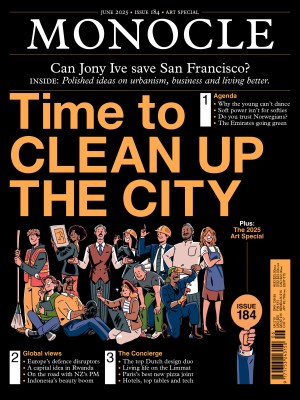Could Kigali become Africa’s Dubai?
A nation once scarred by war is pushing towards a brighter, cleaner and greener future. We tour Kigali to find out what’s driving its reinvention.
Rwanda might be synonymous with some of the worst crimes in recent human history but the predominant feeling in the country today is that of an optimistic future. Under the aegis of its 68-year-old president, Paul Kagame, who last year won a fourth consecutive election victory with more than 99 per cent of the vote, the country has experienced rapid economic growth, with GDP increasing by about 8 per cent every year since 2007. Rwanda is seen as a beacon of prosperity and peace not just in East Africa but the wider continent and in the past decade has climbed 100 places up the World Bank’s Doing Business index, now ranking second in Africa and 38th globally.
Nowhere in the country is this economic progressivism felt more than in Rwanda’s 1.7-million strong capital, Kigali, which is responsible for 41 per cent of the country’s GDP. Take to its highways and you see an urban centre shaped by an ambitious Plan for 2030, which focuses on sustainable development, as well as the nation’s Vision 2050 roadmap, whose goal is to ensure that Rwanda is a high-income country with improved living standards by the middle of the century. Either side of you are well-swept roads, their neat verges bordering smartly guarded buildings that point to a national ambition to lead a continent in security, business incubation and sports tourism.

As you’re whisked through the city’s airport, you’ll see dozens of golf balls on adverts, as pristinely white as the terminal’s many pillars. Is this really the capital city of a country that just over 30 years ago was still embroiled in a civil war that caused the deaths of hundreds of thousands of people? Yes, and its impressively landscaped 18 holes are among a few things – an influx of foreign capital, improving infrastructure and a culture of surveillance – that you might judge it to have in common with, say, Abu Dhabi or Singapore.
As with those city-states, observers believe that Kigali’s serenity and stability come at a cost: namely, the suppression of human rights and personal freedoms. Since Kagame’s 2017 victory, according to Human Rights Watch, at least five opposition politicians and four government critics and journalists have died or disappeared in suspicious circumstances, though Rwandan officials deny any wrongdoing. As a visitor, to travel Kigali’s streets is to be awed by their cleanliness but also perturbed by the hushed swivel of thousands of cameras and the watchful eyes of many more uniformed (and plainclothes) policemen. That said, foreign capital craves stability, especially during times of upheaval, and Kigali (like the UAE) is becoming a more attractive prospect. In 2023 it received a large proportion of the €630m of direct foreign investment in Rwanda, most of which came from the likes of Kenya, India, Germany and France.
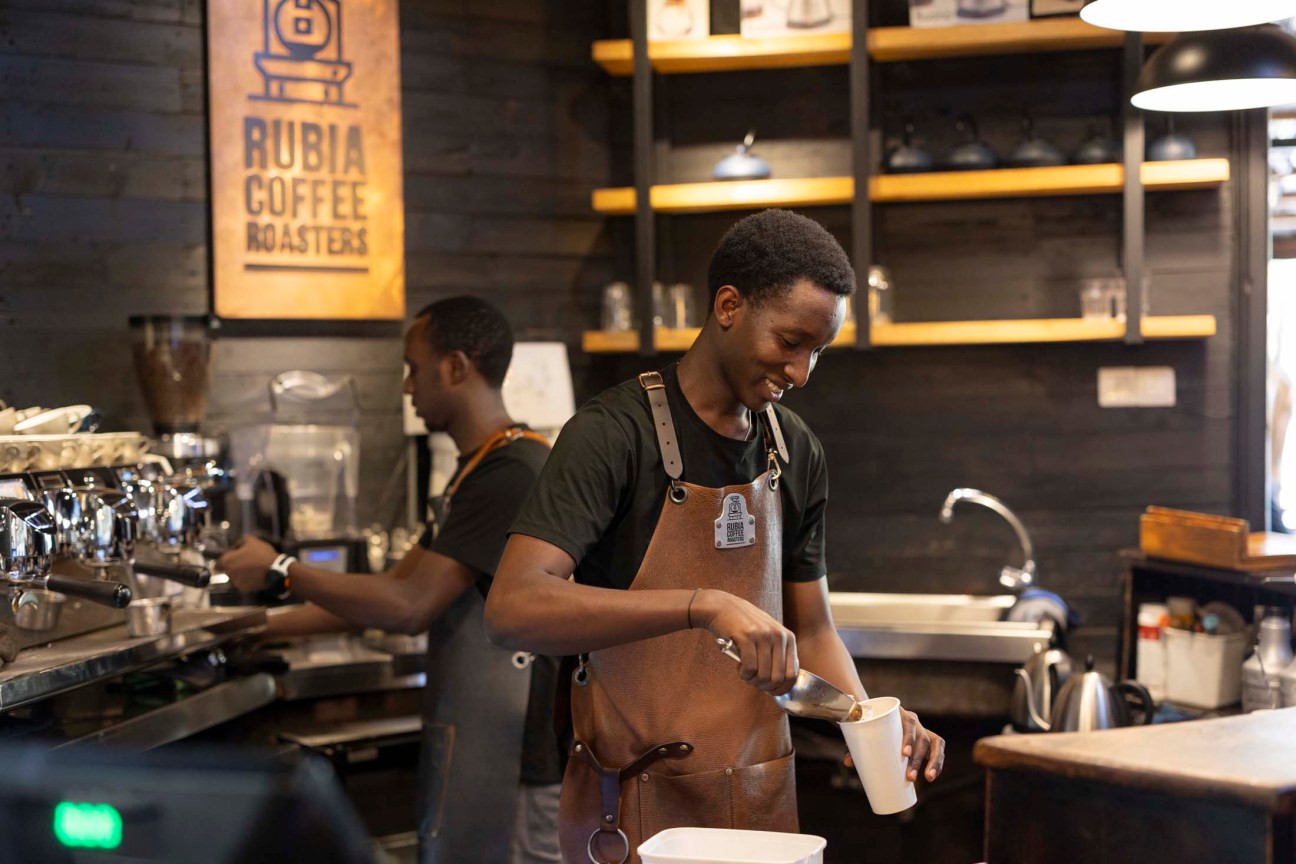


Mayor Samuel Dusengiyumva beams from behind a large desk in his airy city hall office. “The national government and the city have such big plans, for infrastructure, services, health and cleanliness,” he says. Dusengiyumva is a youthful 44 but old enough to have been a teenager during the genocide of 1994 that caused the deaths of 800,000 Rwandans. “Of course, the city is linked to the country’s history,” he adds. “Because of the 1994 genocide, the country shut down and Kigali was the most affected part. The fighting was very intense and the destruction and damage to infrastructure was everywhere.”
Its subsequent transformation didn’t happen overnight. “In 2000 the city was like a village,” says the mayor. “No roads, water not getting to different neighbourhoods – even accessing the airport was a problem because everything else was a priority.”
Talking so plainly of national tragedy would be anathema to political leaders from other countries but Dusengiyumva seems to embody contemporary Rwandans’ attitude that the genocide be invoked to push its citizens forward. “In 2002 the road network in Kigali was 102km for a city of 730 sq km but today we’re at about 700km of roads, with neighbourhoods joined up, the city joined up and people joined up.”
The idea of unity through tarmac is both romantic and practical in the Land of a Thousand Hills (as Rwanda is known). Indeed, at Dusengiyumva’s swearing-in ceremony, he talked of ensuring infrastructure for those still in need. Shortly after taking office he announced a further 40km of new roads to be built in the city. Of course, the mayor’s duties are a little more complex than healing through highways. Dusengiyumva also aims to attract the skills and investment that the city needs to get it off the ground. “Engineers, architects, developers, students, experts in technology and entrepreneurs” are who the mayor lists as requirements for a successful civic strategy.
Meanwhile, the widely derided schemes of European countries such as the UK that involve paying Rwanda to take their unwanted migrants are, anecdotally at least, not viewed so negatively in a country looking to grow and become more multicultural, as well as shake off the negative associations that its name still holds in much of the world. “People ask, ‘How did you do it, after that history?’” says Dusengiyumva. “The answer is that we know the power of vision – if you’re together and connected, you can do anything.”
Norrsken, a business and technology incubator, is all about vision and connectedness too. Founded by Swedish entrepreneur Niklas Adalberth in 2016, it’s a non-profit social-impact foundation. It operates hubs in Stockholm, Brussels, Barcelona and Kigali, which offer shared office spaces, expertise and investment advice. Kigali’s Norrsken House is just a few blocks from city hall. It sits in a downtown that contains international banks and hotels, as well as two of Kigali’s best-known genocide attractions, the Belgian Peacekeepers Memorial and the Hôtel des Milles Collines (the inspiration for the 2004 film Hotel Rwanda). Today the area is alive with joggers, taxis ferrying hotel guests and cafés leaning into a timber-clad Scandinavian aesthetic. Norrsken is a high-ceilinged, light-filled and solar-powered home of bright ideas, shared resources and competitive good humour.

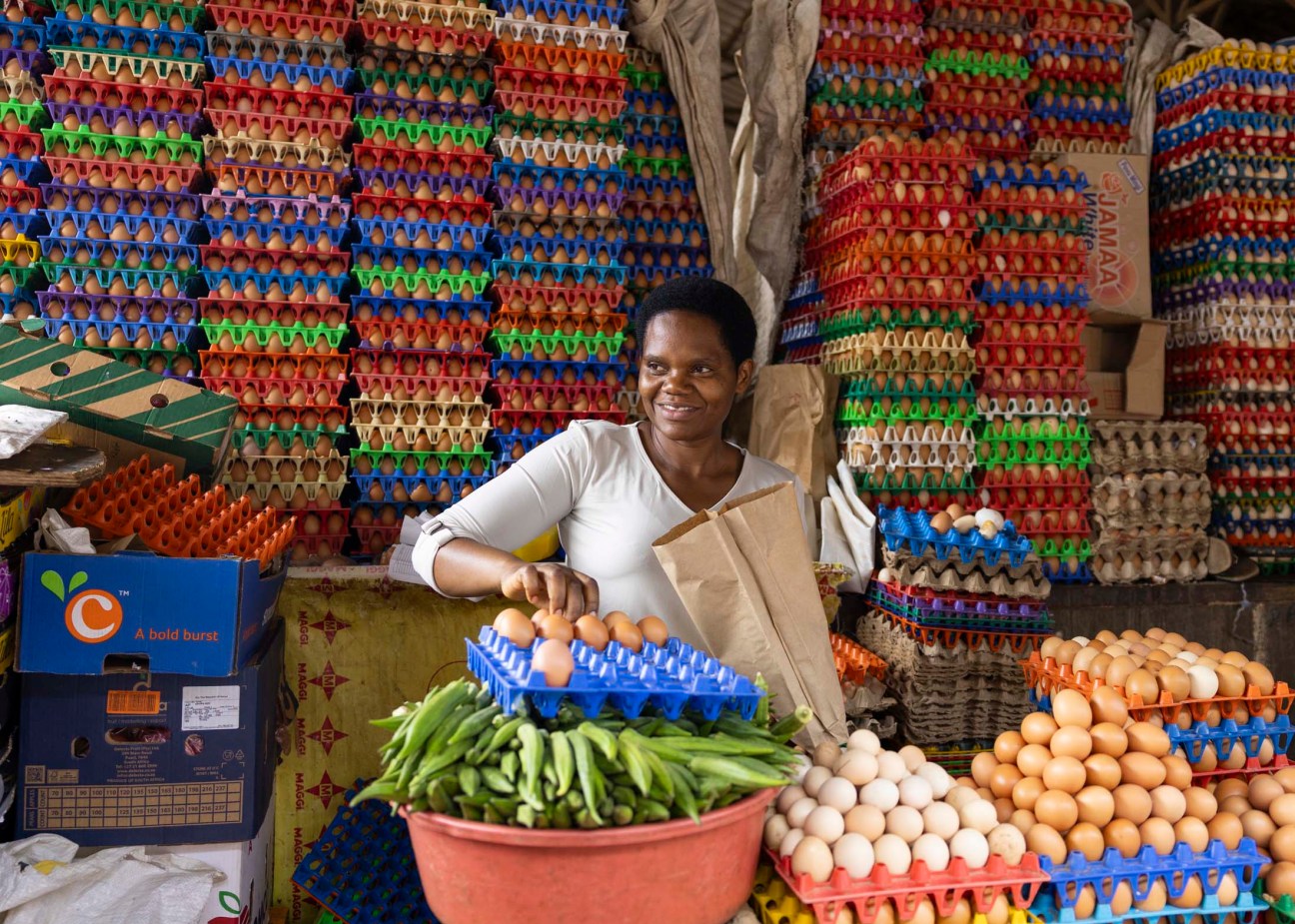
How did Elie Habimana, managing director, start off here? “I began as a computer-science engineer but my first assignment was to build the house, to look after that,” he says. So you turn up for an interview, they tell you, “Congratulations! You’ve got the job!” and then ask you to build the office? “Well, not exactly,” says Habimana, with a chuckle. “I had a background in project management but we are a hands-on organisation.” Kigali’s Norrsken has about 1,400 members and associations with some 350 companies, from local telecoms firm Africa’s Talking to Swiss pharma giant Novartis. Norrsken is a hub for small starters in need of desks as well as for advanced businesses.
“I don’t call any of them start-ups because the range and scale are quite broad,” says Habimana. “The aim for us is to wrap up talent, technology and development. After all, Kigali is positioning itself as a proof-of-concept market.” Habimana cites drone-delivery firm Zipline, which, while US-owned, began in Kigali and now transports medical supplies and agricultural essentials around Rwanda’s less-connected regions. Similarly, AFEX is an agricultural commodities exchange whose founders all met at a Kigali conference.
Back on the streets, things are being built, including the Kigali Green Complex, a 35-floor tower that is set to become the tallest building in the country; Zaria Court, a mixed-use entertainment and retail complex that will incorporate a basketball arena, hotel and restaurants; and, a bit further out, a new international airport built in partnership with Qatar Airways, which has taken a 60 per cent €1bn stake in an aim to make Kigali a regional aviation hub. The dig and clatter of all of this construction meets the traffic’s rumble and the horns of motos, the two-wheeled taxis that will take you anywhere for 50 cents.
But Kigali isn’t Cairo-crazy or Manhattan-mad; it’s an equable rush hour, a calmer commute. At a red light’s lull or on a shaded side street, the sound of the old green forests that the Rwandan capital was carved from by German colonialists in the early 20th century return: the bee-eaters, boubous and firefinches’ songs are more melodic than the ringtones and radios. This is the green and pleasant past that Kigali aims to embrace again among its developments and betterments, to happily mix city and nature.
Mayor Dusengiyumva talks of his aim to restore the city’s nature-rich wetlands, which were once home to more than 1,000 species of birds and bugs. Kigali City and the Rwanda Environmental Management Authority are working on a multiyear regeneration scheme that has planted 17,000 trees and restored the key Nyandungu wetland in the east of the city to alleviate flooding and increase biodiversity.
As we head northeast to the Nyarutarama neighbourhood to meet Bonita Mutoni, the more manicured version of Kigali’s verdure swings back into frame. Mutoni is the founder of Uber Luxe Safaris, a firm she set up in 2012 after working in luxury PR and helicopter leasing, and noticing that there were “wealthy friends of Rwanda for whom there wasn’t a company that could deliver an experience from beginning to end”.

Uber Luxe takes clients to high-end lodges in the Rwandan hill forests that border Uganda and the drc and are home to many of the country’s 1,000 or so gorillas – traditionally the main draw for non-African visitors to this part of the world. The gorillas have been well known to change people’s ideas of how and why they travel, what they conserve and their very attitude to life on earth. “It can be emotional for people, for sure – it certainly is for me,” says Mutoni.
The world can surely agree that the nature is stunning, fascinating and humbling. But what of the governance that makes Kigali a place where such a demanding venture in luxury hospitality could flourish? Without being quite as red-in-tooth-and-claw as the fauna, the power arrayed around Kagame, who has run Rwanda for almost 30 years, is absolute. Could it be that things work… or else? From the perspective of a local business-owner, it seems that the firm approach works. “You sense it as soon as you arrive at the airport,” says Mutoni, whose travels are as extensive as any of her wealthy clients’. “The airport’s right in the city, you get a visa on arrival, it’s easy to navigate and clients spend a day or two in Kigali before going to the hills. The city’s clean and safe. It just works.”
The city’s retail, art and culture offerings are relatively slim but high in quality, while much of the fashion action, such as Haute Baso and House of Tayo, are in the easily accessible suburbs. It’s sport, though, that is the sector most noticeably on the rise in Rwanda – and it’s centred in Kigali. In 2025 the city will host the UCI Road World Championships in September and an early group stage of the Basketball Africa League (BAL, an NBA spin-off), while a Kigali Formula One race has been mooted. “Tourism was all typical leisure or all safari,” says Mutoni. “But since we built the stadium and the arena, the number of sports tourists is just huge. I went to a Rwanda-Nigeria football game recently and it was impressive how many Nigerian tourists – and I mean high-end ones, booking into suites – there were. It was good to see.”
The BAL is also growing – the Armée Patriotique Rwandaise (APR) competes in the league’s Nile division alongside teams from Libya, Kenya and South Africa. “It’s amazing to see so many Africans convene for that,” adds Mutoni. Back in the arena of city governance, however, she is firmly patriotic. “There isn’t anywhere to challenge Rwanda nearby,” she says. “We do business in Kenya, Tanzania and Uganda but Kigali is always the easiest city in all of East Africa.”


As Mutoni pops the cork on some chilled Ruinart, she talks of near-neighbours and an international scene of Africans, especially Nigerians, investing in Kigali property alongside Europeans, Australians and Indians. “Twenty years ago, I knew everyone,” she says. “I grew up in England and it’s a little like that now. We’re becoming a multicultural city. I love it.” After a top-up, Mutoni suggests a toast – and who are we to resist? “We’re working to become the Dubai of Africa – and I think we’ll get there.”
The drive to Kimihurura, in the tight green hills of the old city, is a lolling pleasure after some sparkling refreshment in the gently cooling late afternoon. This neighbourhood, known as Kimmy, has always been something of a leafy enclave for the upper echelons of the old colonials and the wealthy Rwandans and expats of today – people keen on big houses, high walls and guards packing inscrutable expressions and automatic rifles. Gyms, cafés, clubs, restaurants and dog-grooming parlours are sprinkled among the ornate gates of the large, politely recessed villas, which are laden with golden dewdrops and scarlet hibiscus that soften the barbed wire peppering their walls. It’s what you could call classic Kigali: green and pleasant, watchful and calm.
Christian Intwari is a young entrepreneur, NGO founder and event producer who managed the entertainment that went with 2024’s “much-expected” re-election of Paul Kagame. So much-expected, in fact, that any canny event planner could have saved some money by buying the fireworks in bulk four or even eight years in advance. Kagame secured 99.15 per cent of the vote in July 2024 – greater even than Vladimir Putin’s 88.48 per cent from four months earlier. As dusk falls, Intwari’s afternoon “office” has been a corner table at Kivu Noir, one of Kimihurura’s most beloved cafés. It serves cinnamon buns and French toast, boasts of deep coffee knowledge (Rwanda produces about 22,000 tonnes of beans a year) and has wi-fi robust enough to enable every customer to be across a handful of devices at once.
“If we’re talking about neighbourhoods, communities and governance,” says Intwari, “I’d mention the Our Past Initiative, my NGO. We’re interested in bridging the gaps between generations as well as different parts of the city – because the building process of our country is not just building.” Indeed, as Intwari says, across the nation, the last Saturday of every month is a umuganda, a day reserved for communities to meet up and clean their neighbourhoods together. The idea began in 1962 and was revived post-genocide as a way for horrifically divided communities to come together to make things literally and spiritually tidier. The enthusiasm for umuganda is, perhaps unsurprisingly, enjoying a purple patch as Kagame has strengthened his iron rule – though nobody who speaks to Monocle during our three days in the city so much as rolls their eyes at its mention (or of the president’s 99 per cent, for that matter). Nyamirambo is one of the city’s liveliest quarters, a former Arab trading area that’s home to Kigali’s oldest mosque (Muslims make up 2 per cent of the country’s population, while more than 90 per cent is Christian, though interfaith relations are strong). The neighbourhood also houses initiatives such as the Nyamirambo Women’s Center, which aims to counter violence and discrimination against women through a focus on and production of traditional crafts.
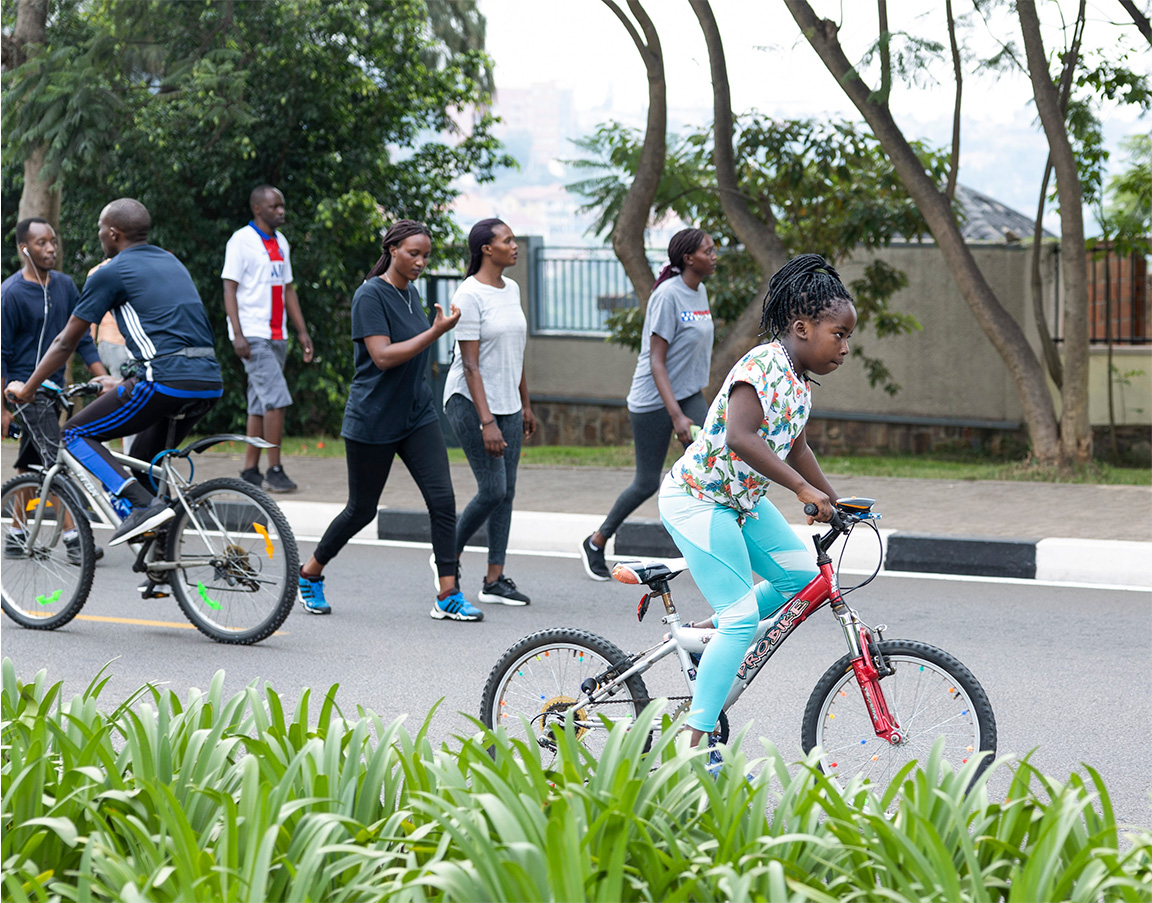
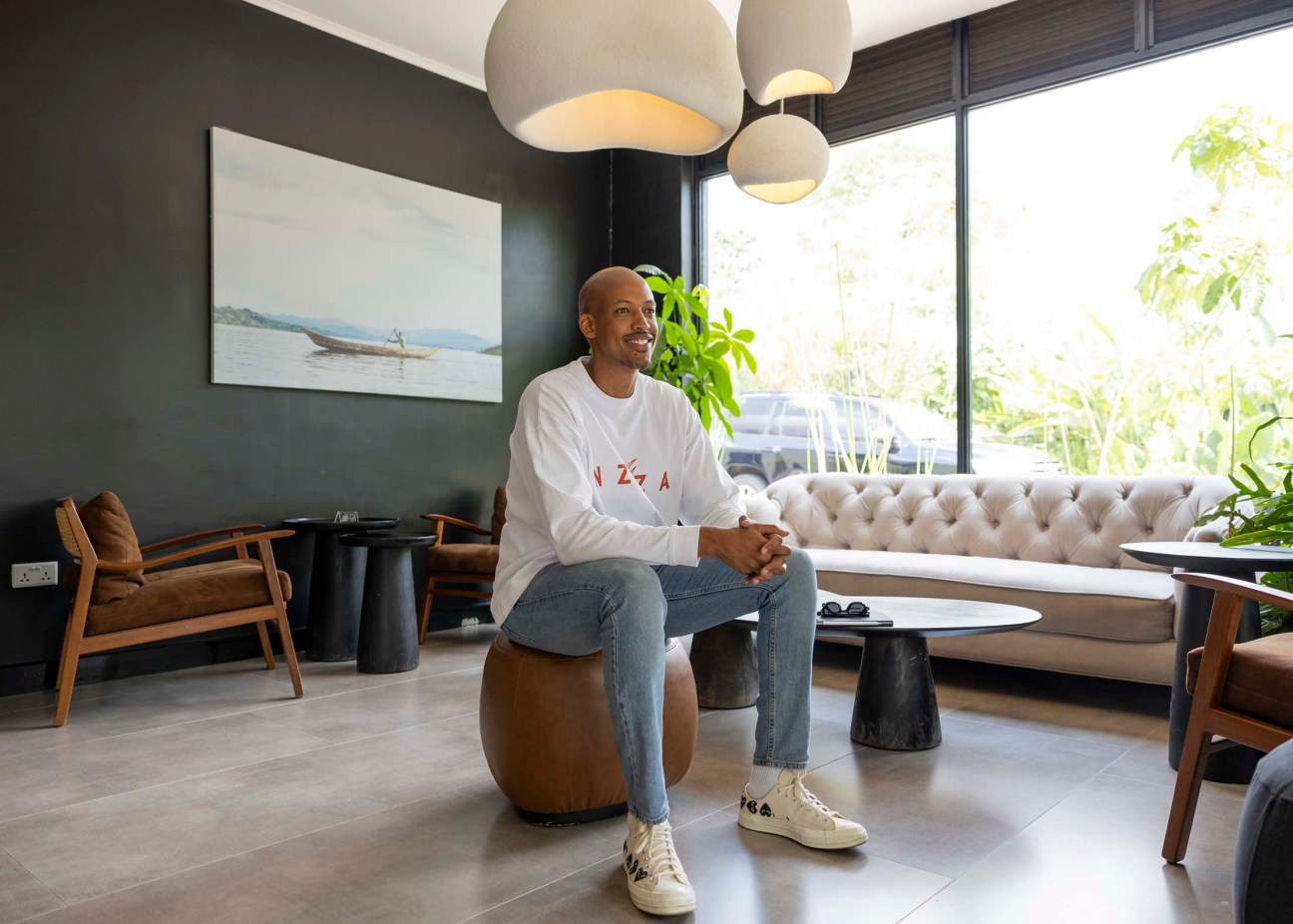
Before Monocle’s trip, Kigali had been described as “full of kick-ass women” by a female contact in Kenya, which is seemingly corroborated by the fact that 49 out of 80 Rwandan MPs are female. Nyamirambo is clearly a creative enclave and, under a bright sun, this neighbourhood of everyday fashion shops is a cacophony of competing hawkers and wannabe-winning signage: “Magnificat Boutique”, “Swagger Shop”, “Yes, Please!” Among the hand-drawn signs for saloons and salons, Timothy Wandulu runs the Concept Arts Studio, where he makes work, holds discussions and teaches others how to paint, sketch and collage. “I sketch the city as it changes,” says the paint-flecked Wandulu. “And it’s changing pretty quickly.”
He is certainly correct but it’s change that is taking the Rwandan capital nearer to the future that it aspires to and further from its grim past. It seems that contemporary Kigali is built on solid stuff. Is it down to mayor Dusengiyumva’s good governance? Well, he would say that – but so does everyone else. A liveable city that attracts investors across business and technology, hospitality and leisure, sport and tourism? Is the talk of parallels to Middle Eastern and Asian cities well on the way to being richly deserved?
After all, they do share a certain something in common. On a morning walk or an evening stroll in the quieter, greener lanes of Kigali, you’re lulled by the sounds of the industry of upkeep as much as birdsong. Straw brooms sweep near-pristine streets, fallen leaves are collected from well-trimmed verges, the snip-snip of secateurs administer to well and truly ruly hedges. Kigali’s bloody history is mostly confined to its poignant and powerful genocide memorial; it is not obviously borne out in that emphasis on security, the high gates or well-trained guards.
It might seem like a peculiar proposition but Kagame’s firm grip on power has brought peace and prosperity here. Perhaps peace needs governance, liveability needs safety and investment needs security. Under the jacarandas at dusk, the bee-eaters and firefinches squabble and warble like people but fly off to roost in the same cool branches. The talk here? It’s good.
Rwandan genocide
The 1994 genocide lasted 100 days and led to the murder of at least 800,000 people across the country. The trigger for the massacre was the assassination of the then-Rwandan president, Juvénal Habyarimana, who had led the country since 1973 and whose plane was shot down with a surface-to-air missile on its approach to Kigali airport on 6 April.
Habyarimana’s killing unleashed a wave of violence against the minority Tutsi ethnic group. The president was a member of the majority Hutus, who had long been marginalised under colonial rule, which favoured the Tutsi as a ruling class. After seizing power in a military coup in 1973, Habyarimana maintained the pro-Hutu line and used government propaganda and his deadly militia, the Interahamwe, to spread fear and dehumanise the Tutsis.
The genocide was ended on 4 July 1994 when the Rwandan Patriotic Front (RPF), a revolutionary paramilitary group made up of mostly Tutsi men exiled to neighbouring Uganda, swept into Kigali and overthrew the Hutu government. The RPF was led by Paul Kagame, who remains the Rwandan president to this day.


